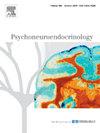急性应激对隶属关系和亲社会性的影响
IF 3.4
2区 医学
Q2 ENDOCRINOLOGY & METABOLISM
引用次数: 0
摘要
有人认为,急性压力会增加人类的亲社会性,这表明了一种倾向和朋友的反应,但实证研究结果仍是喜忧参半。尽管大多数先前的研究都将亲社会性与经济游戏结合起来,但我们认为,友谊主要以隶属关系为特征,因此不能在这种匿名环境中表现出来。我们在两项预先注册的研究中调查了急性应激对亲社会性和隶属关系的影响。在一项试验性实验室研究中(N = 74),参与者在马斯特里赫特急性压力测试前后玩了一个包括面对面互动的合作电子游戏。在一项准实验实地研究中(N = 168),我们在大学考试前(压力条件)与常规讲座(对照条件)评估了隶属关系和亲社会性。与“倾向与成为朋友”理论一致,急性压力在两项研究中都增加了联系。此外,在我们的实验室研究中,对压力源反应的隶属关系越高,主观压力的减少就越强,这表明隶属关系可能是一种有效的应对机制。在两项研究中,我们都没有发现压力对亲社会的主要影响。相反,社会价值取向预测了压力下亲社会倾向的变化。与非压力环境相比,压力环境下亲社会倾向(即社会价值取向值较高)的倾向与亲社会倾向相关。本文章由计算机程序翻译,如有差异,请以英文原文为准。
Disentangling the Effects of Acute Stress on Affiliation and Prosociality
It has been suggested that acute stress increases prosociality in humans, indicating a tend-and-befriend response, but empirical findings are yet mixed. Although most prior studies operationalized prosociality with economic games, we argue that befriending is primarily characterized by affiliation and, therefore, cannot be shown in such anonymous settings. We investigated effects of acute stress on both prosociality and affiliation in two pre-registered studies. In an experimental laboratory study (N = 74), participants played a cooperative video game involving face-to-face interactions before and after the Maastricht Acute Stress Test. In a quasi-experimental field study (N = 168) we assessed affiliation and prosociality before a university exam (stress condition) versus a regular lecture (control condition). In line with the tend-and-befriend theory, acute stress increased affiliation in both studies. Moreover, in our laboratory study, higher affiliation in response to the stressor was associated with a stronger decrease in subjective stress, suggesting that affiliation might be an effective coping mechanism. We did not find a main effect of stress on prosociality in either study. Instead, Social Value Orientation predicted changes in prosociality under stress. A more prosocial orientation (i.e., higher values in Social Value Orientation) was associated with higher prosociality under stress as compared to non-stressed.
求助全文
通过发布文献求助,成功后即可免费获取论文全文。
去求助
来源期刊

Psychoneuroendocrinology
医学-精神病学
CiteScore
7.40
自引率
8.10%
发文量
268
审稿时长
66 days
期刊介绍:
Psychoneuroendocrinology publishes papers dealing with the interrelated disciplines of psychology, neurobiology, endocrinology, immunology, neurology, and psychiatry, with an emphasis on multidisciplinary studies aiming at integrating these disciplines in terms of either basic research or clinical implications. One of the main goals is to understand how a variety of psychobiological factors interact in the expression of the stress response as it relates to the development and/or maintenance of neuropsychiatric illnesses.
 求助内容:
求助内容: 应助结果提醒方式:
应助结果提醒方式:


